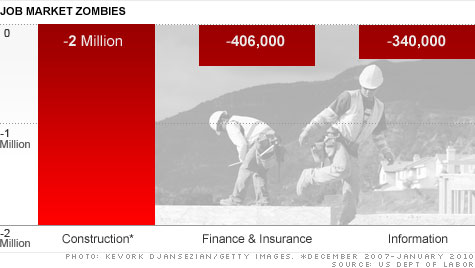
NEW YORK (CNNMoney) -- Think of them as the industries the recovery has left behind.
Construction. Finance and insurance. Media.
For workers in these areas, the job prospects aren't much better today than they were at the start of the Great Recession.
Employment levels hit four-year lows in April in more than a dozen sectors tracked by the Labor Department. Another 10 hit lows in the first three months of the year and have shown little gain since, according to an exclusive CNNMoney analysis.
The problems persist even while nearly three out of four other business sectors have been adding jobs over the last six months.
For job seekers with these fields on their résumés, talk of a hiring rebound rings awfully hollow. And economists warn not to expect any quick turnaround in some of these industries.
Construction is the biggest hole in the job market. Job losses started there well before the start of the recession in December 2007, but since then, the construction industry shed a staggering 2 million jobs, or 27% of its the pre-recession jobs.
"Construction is just starting to turn, but it's not going to come back fast," said Mark Zandi, chief economist of Moody's Analytics. "And it's not getting back to the levels we saw during the boom anytime in the foreseeable future."
The finance and insurance sector also has yet to recover from the damage wrought by the collapse of the housing bubble. Those sectors are down a combined 400,000 jobs since the start of the recession, hitting a new 11-year low in April, or 7% of the jobs in the sector.
Manufacturing of big ticket items has shown a nice rebound as of late, with industries such as automakers bringing back about 20% of the jobs that were shed from the start of the recession to the low point.
But manufacturers of nondurable goods -- consumable items like textiles and clothing, chemicals, beverages and tobacco products -- are still at very low employment levels. Overall, those manufacturers lost 600,000 jobs between the start of the recession and January of this year, and have only brought back about 20,000 of those jobs since, even as the fortunes of the businesses themselves have improved.
"Those jobs are not likely to come back," said Mark Vitner, senior economist with Wells Fargo Securities. "Those plants are so automated, you have to increase output an awful lot to create very many jobs. At least we're not seeing new plant closings."
Telecommunication jobs have also taken a major hit, despite stronger demand, said Zandi. That industry hit a record low in April.
Overall the sector has shed 160,000 jobs, or 15%, of its pre-recession employment levels.
Some industries were already struggling before the recession, and the economic downturn was simply a catalyst for their decline.
Information, for example, which includes publishing, broadcasters and other traditional media, hit a new 27-year low in March. It has lost 11% of its jobs, or 342,000 staffers, since the start of the recession.
"That's about the long-running shift from paper to digital," said Zandi. "There's no turning back there. There are probably more declines coming, even if we're past the worst of it." ![]()
| Latest Report | Next Update |
|---|---|
| Home prices | Aug 28 |
| Consumer confidence | Aug 28 |
| GDP | Aug 29 |
| Manufacturing (ISM) | Sept 4 |
| Jobs | Sept 7 |
| Inflation (CPI) | Sept 14 |
| Retail sales | Sept 14 |